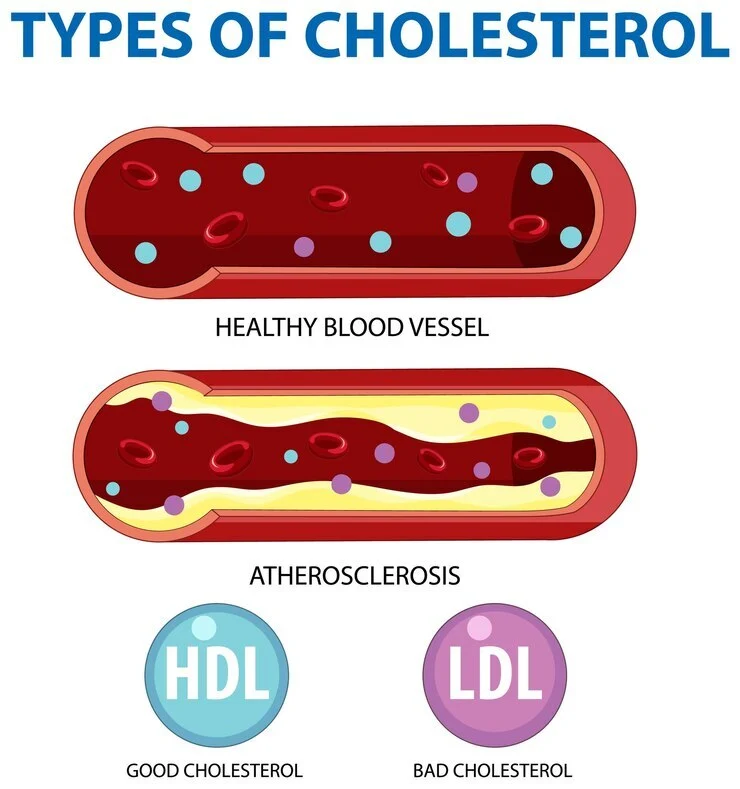High cholesterol is often associated with heart health, but it can also impact your skin. While it might not be the first thing that comes to mind, managing cholesterin levels can contribute to a clearer, healthier complexion. Let’s dive into natural ways to lower your cholesterin and potentially improve your skin.
Understanding Cholesterol and Its Impact on Skin
Before we delve into solutions, it’s essential to grasp the connection between cholesterin and skin health. Cholesterol, a waxy substance produced by your liver, is crucial for various bodily functions. However, high levels of “bad” cholesterol (LDL) can contribute to plaque buildup in your arteries, increasing the risk of heart disease.
While the exact mechanisms linking cholesterin to skin conditions are still under investigation, some studies suggest a correlation between high cholesterin and certain skin issues. For instance, some research indicates a potential link between high cholesterin and acne, though more studies are needed to confirm this.
Natural Ways to Lower Cholesterol
Fortunately, many lifestyle changes can help you lower your cholesterin levels naturally. These modifications not only benefit your heart health but may also positively impact your skin.
1. Dietary Adjustment
- Prioritize heart-healthy fats: Opt for unsaturated fats found in avocados, olive oil, nuts, and seeds. These fats can help reduce LDL cholesterol.
- Embrace fiber-rich foods: Soluble fiber, present in oats, beans, lentils, and fruits like apples and berries, can help lower cholesterin by binding to it in the digestive tract.
- Limit saturated and trans fats: Found in red meat, full-fat dairy products, and processed foods, these fats can elevate LDL cholesterol levels.
- Reduce refined carbohydrates: Excess intake of sugary drinks and processed grains can contribute to high cholesterin and other health issues.
2. Physical Activity
Regular exercise is a cornerstone of cholesterin management. It helps boost “good” cholesterol (HDL) and can contribute to weight loss, another factor influencing cholesterin levels. Aim for at least 150 minutes of moderate-intensity exercise or 75 minutes of vigorous-intensity exercise per week.
3. Maintain a Healthy Weight
Being overweight or obese can increase your risk of high cholesterin. Gradual weight loss through a balanced diet and regular exercise can significantly improve cholesterin levels.
4. Manage Stress
Chronic stress can contribute to various health problems, including elevated cholesterin. Incorporate stress-reduction techniques like meditation, deep breathing, or yoga into your routine.
5. Adequate Sleep
Sufficient sleep is essential for overall well-being. Aim for 7-9 hours of quality sleep each night to support cholesterin regulation and skin health.
6. Consider Plant Sterols and Stanols
These compounds, found in some plants, can interfere with cholesterin absorption in the intestines. They are often added to foods like margarine and yogurt.
Additional Tips for Skin Health
While lowering cholesterin can indirectly benefit your skin, consider these skincare practices for a healthy complexion:
- Gentle cleansing: Avoid harsh cleansers that can strip your skin of natural oils.
- Moisturization: Keep your skin hydrated with a suitable moisturizer.
- Sun protection: Shield your skin from harmful UV rays with sunscreen.
- Balanced diet: A diet rich in vitamins, minerals, and antioxidants supports skin health.
Disclaimer: While these natural approaches can be effective for many, it’s essential to consult with a healthcare professional for personalized guidance, especially if you have underlying health conditions. They can monitor your cholesterin levels and provide tailored recommendations.
By combining dietary adjustments, regular exercise, and other lifestyle changes, you can take steps to lower your cholesterin and potentially improve your skin’s appearance. Remember, consistency is key, and sustainable habits lead to long-term benefits.
Remember, consistency is key. Even small amounts of exercise can make a difference in your cholesterin levels and overall well-being.





